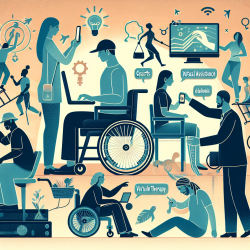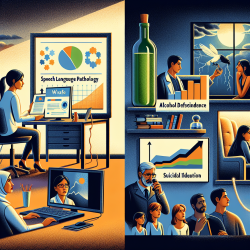Introduction
The gig economy has emerged as a significant employment sector, offering flexible work arrangements for many, including individuals with disabilities. The research article "Gig Workers with Disabilities: Opportunities, Challenges, and Regulatory Response" explores the potential and hurdles faced by disabled gig workers. As practitioners in the field of online therapy, understanding these dynamics can enhance our ability to support and empower this workforce.
Opportunities in the Gig Economy
For individuals with disabilities, the gig economy presents unique opportunities to engage in self-directed work. This flexibility allows them to manage their schedules and create personalized, accessible work environments. Such arrangements are particularly beneficial for those with invisible disabilities, as they can work without disclosing their conditions, thus avoiding potential stigma.
Moreover, gig work can serve as a stepping stone towards economic independence, offering a platform for individuals to showcase their skills and build a professional network. For many, it provides a viable alternative to traditional employment, which often poses structural and attitudinal barriers.
Challenges Faced by Disabled Gig Workers
Despite the opportunities, gig work is not without its challenges. Many disabled individuals lack the necessary resources and training to enter this sector. The financial burden of acquiring equipment and maintaining compliance with legal requirements can be daunting.
Furthermore, gig workers are often excluded from traditional employee benefits such as health insurance, retirement plans, and job security. This exclusion is compounded by the risk of losing governmental benefits if their income exceeds certain thresholds, creating a disincentive to pursue gig work.
Regulatory Responses and Future Directions
Regulatory frameworks have struggled to keep pace with the gig economy's rapid growth. In the U.S., for example, gig workers are typically classified as independent contractors, which limits their access to employment protections. Some jurisdictions, like California, have attempted to reclassify gig workers as employees, but these efforts have been met with resistance.
Innovative regulatory approaches are needed to ensure that gig workers, especially those with disabilities, receive fair treatment and access to necessary accommodations. This includes considering universally designed technologies that can make gig platforms more accessible.
Conclusion
As practitioners, it is crucial to stay informed about these developments and advocate for policies that support disabled gig workers. Encouraging further research and dialogue can lead to more inclusive and equitable work environments.
To read the original research paper, please follow this link: Gig Workers with Disabilities: Opportunities, Challenges, and Regulatory Response.










